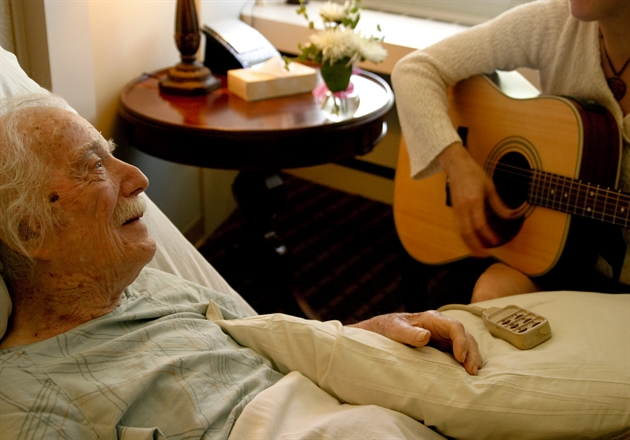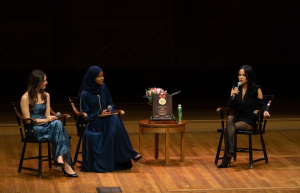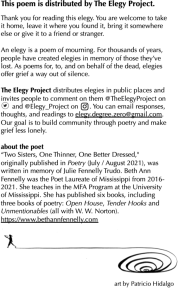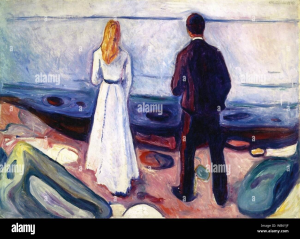The palliative care musical “Night Side Songs” delves into the profound themes of illness and mortality through a rich tapestry of narrative and song. Created by the talented Lazour brothers, this innovative production shines a spotlight on the often-tumultuous journey faced by cancer patients, with insights from palliative care specialist Susan Block. With a backdrop of the Harvard American Repertory Theater, the musical invites audiences to confront the realities of death in a moving and artistic way. By weaving together the voices of doctors, patients, and caregivers, it breaks the stigma surrounding discussions of end-of-life care. “Night Side Songs” not only entertains but also encourages meaningful conversations about life’s most challenging experiences, making it a unique theater about death that resonates deeply with those touched by serious illness.
Exploring the realm of end-of-life experiences, the theater production “Night Side Songs” captures the essence of the emotional landscape involved in facing terminal illness. This compelling musical, which stems from extensive collaboration with experts in psychosocial oncology, offers a nuanced perspective on the struggles of patients and their families. By presenting such intimate narratives, it challenges our societal norms regarding discussions about dying, providing a platform for reflection and empathy. Inspired by numerous medical insights, this cancer patient musical not only educates but also enriches the audience’s understanding of palliative care. As an artistic endeavor, it serves both as entertainment and vital discourse, blending heartfelt storytelling with the realities of life’s final chapters.
The Impact of ‘Night Side Songs’ on Palliative Care Awareness
‘Night Side Songs’ represents a transformative shift in how palliative care and conversations about death are approached in contemporary theater. By addressing the profound realities of illness and the experiences of patients, families, and healthcare providers, the musical sheds light on the often-taboo subject of dying. Palliative care specialists like Susan Block emphasize the importance of these dialogues, revealing that societal silence around mortality can lead to isolation for both patients and caregivers. Through its evocative storytelling, this musical encourages audiences to engage in essential discussions about illness in a way that is both moving and cathartic.
The musical’s integration of palliative care themes challenges traditional narratives in theater, offering depth and emotional resonance that viewers may not expect from a production centered on such a serious subject. In the context of cancer care, ‘Night Side Songs’ serves as a crucial platform for education, raising awareness for end-of-life issues and showcasing the role of healthcare professionals in supporting patients through their journeys. Its thoughtful portrayal of the realities faced by cancer patients reflects the significant strides made in psychosocial oncology, an area where Susan Block has led pioneering efforts.
Exploring the Role of Palliative Care in Modern Theater
The inclusion of palliative care narratives within theater not only enriches the cultural dialogue surrounding death but also highlights the therapeutic aspects of storytelling. In productions like ‘Night Side Songs,’ the emotional experiences of patients and their families are front and center, providing audiences with a firsthand look at the complexities of terminal illness and the support systems in place. Susan Block’s contributions to the musical underline the importance of integrating health care perspectives into the arts, demonstrating how theater can facilitate healing conversations about the end of life.
Theater as a medium allows for a unique form of emotional expression that can resonate deeply with audiences. By inviting viewers to engage with the material through singing and interaction, ‘Night Side Songs’ creates a shared space where the discomfort of discussing death can transform into an opportunity for connection and understanding. This innovative approach to storytelling could be a pivotal step in redefining how palliative care is perceived in society, moving it from a hushed topic to one that is embraced in artistic expressions, creating a richer cultural tapestry.
Susan Block and the Evolution of Palliative Care
Susan Block’s groundbreaking work in palliative care has significantly influenced how the medical community approaches end-of-life issues. As the founding chair of psychosocial oncology and palliative care at prestigious institutions such as Dana-Farber Cancer Institute and Brigham and Women’s Hospital, her advocacy for compassionate care has paved the way for integrating emotional support into treatment. Her skepticism about a musical addressing death reflects a common misconception; however, ‘Night Side Songs’ aims to challenge these notions by presenting an authentic narrative that resonates with the audience’s lived experiences with illness.
Her insights into the emotional struggles faced by patients during their treatment processes have been crucial in shaping the narrative of ‘Night Side Songs.’ The musical highlights the psychological complexities of grappling with mortality, which Block has tirelessly advocated for throughout her career. By educating the public through performance art, she aims to dismantle the stigma surrounding discussions of death, inspiring others in the healthcare field to view palliative care as an essential component of comprehensive medical practice.
The Connection Between Music and Healing in Palliative Care
‘Night Side Songs’ vividly illustrates the powerful connection between music and healing, especially within the context of palliative care. Music therapy has long been recognized for its benefits in enhancing the quality of life for patients, particularly those experiencing serious illnesses such as cancer. Drawing from personal and emotional narratives, the musical employs melody and lyricism to evoke feelings that might otherwise remain unexpressed, making the path towards acceptance and understanding more accessible for both patients and their loved ones.
Research has shown that music can reduce anxiety, improve mood, and even alleviate pain perception in patients with terminal conditions. Incorporating musical elements into the storytelling of ‘Night Side Songs’ not only entertains but provides a therapeutic outlet, allowing audiences to reflect on their own experiences with illness and loss. This innovative blending of art and health serves as a reminder of the holistic approach advocated by palliative care specialists, promoting emotional well-being as a crucial factor in patient care.
The Cultural Significance of ‘Night Side Songs’ in Contemporary Theater
‘Night Side Songs’ holds a distinct place in contemporary theater as it invites audiences to confront the often-ignored topic of death. By setting the narrative around a young cancer patient, the show humanizes experiences that many find difficult to discuss openly. The cultural significance of this production extends beyond entertainment, pushing theatrical boundaries to provoke thought and start conversations about mortality in a format that is accessible and engaging.
As theatrical productions like ‘Night Side Songs’ continue to emerge, they challenge societal norms and help normalize discussions about death, illness, and grief. By doing so, these narratives encourage audiences to reflect on their own experiences and relationships with dying, fostering a community of empathy and understanding. Institutions like Harvard’s American Repertory Theater play a vital role in amplifying such stories, making them integral to the conversation about health care practices and personal connections during life’s final stages.
Bridging the Gap Between Medicine and the Arts
The collaboration between palliative care specialists and theater practitioners exemplified in ‘Night Side Songs’ highlights the importance of bridging the gap between medicine and the arts. With both fields dedicated to enhancing human experience, their intersection allows for rich storytelling that can convey the complexities of illness with depth and authenticity. By involving experts like Susan Block, the musical gains credibility and ensures that the portrayal of medical realities remains grounded in truth.
Furthermore, this collaboration opens the door for further interdisciplinary initiatives, where artists and healthcare professionals can work together to develop narratives that resonate with the public. Engaging art forms that incorporate elements of healthcare knowledge serve to demystify medical experiences and foster a sense of community around difficult topics. As seen in productions like ‘Night Side Songs,’ these partnerships have the potential to revolutionize how we perceive and discuss palliative care within society.
Audience Engagement Through Intimate Theater Experiences
The decision to perform ‘Night Side Songs’ in intimate settings rather than traditional theater spaces greatly enhances audience engagement. By facilitating a more personal connection between performers and attendees, productions can evoke deeper emotional responses, making the themes of the play resonate on a more profound level. Theater in the round encourages participation, allowing for a communal experience that mirrors the shared journeys through illness and caregiving depicted in the narrative.
Diane Paulus, Artistic Director of A.R.T., emphasizes that such intimate venues are purposeful in expanding the boundaries of theater. By reducing audience size and encouraging participatory elements, they create an environment where individuals can connect not just with the story being told but with one another, creating a shared understanding of the complex emotional landscape surrounding death and dying. This innovative approach not only enriches the theatrical experience but also cultivates conversations that extend beyond the performance itself.
Empathy Through Shared Experiences in Performing Arts
Empathy is a central theme in both palliative care and theater, and ‘Night Side Songs’ serves as a bridge between these two realms, fostering understanding through shared experiences. The musical allows audiences to witness the emotional realities faced by cancer patients and their families, creating a space for empathy to flourish. Susan Block’s insights into the patient experience enhance this empathetic connection, underscoring the importance of recognizing the vulnerability that accompanies serious illness.
As audiences engage with the characters and their stories, they confront their own feelings about life, death, and what it means to care for others. This shared experience can lead to profound empathy, prompting viewers to reflect on their personal lives and relationships. In this way, ‘Night Side Songs’ not only entertains but also challenges audiences to develop a deeper understanding of palliative care and the emotional complexities of facing mortality.
Future Directions for Palliative Care in Artistic Expressions
The success of ‘Night Side Songs’ has opened new avenues for incorporating palliative care themes into artistic expressions. This musical has demonstrated that the arts can play a vital role in raising awareness about end-of-life issues, challenging the stigma often associated with death. By integrating stories of patients, healthcare providers, and families into theatrical performances, the potential for deeper engagement with these themes becomes even more pronounced.
Looking ahead, it is essential to continue exploring how different art forms—whether through music, drama, or visual arts—can serve as platforms for discussing the intricacies of palliative care. By fostering collaborations between artists and healthcare professionals, future productions can continue to normalize conversations about death, ultimately paving the way for cultural shifts in how society views serious illness and caregiving. ‘Night Side Songs’ is just the beginning of a broader movement toward embracing and celebrating life, even amidst its inevitable conclusion.
Frequently Asked Questions
What is the main theme of the palliative care musical ‘Night Side Songs’?
The palliative care musical ‘Night Side Songs’ explores themes of illness, death, and the experiences of cancer patients. It reflects on the emotional journey of patients, caregivers, and clinicians, inspired by Susan Sontag’s notion that ‘illness is the night side of life.’
How does Susan Block contribute to ‘Night Side Songs’ as a palliative care expert?
Susan Block, a leading palliative care specialist, provided invaluable insights during the development of ‘Night Side Songs.’ Her expertise helped the creators accurately portray the complexities of end-of-life care, ensuring the musical resonates with the realities faced by cancer patients and their families.
In what ways does ‘Night Side Songs’ aim to change perceptions about death and dying?
‘Night Side Songs’ seeks to transform the dialogue surrounding death and dying by inviting audiences to engage deeply with these topics through musical storytelling. By showcasing the emotional struggles of cancer patients, it encourages open conversations about end-of-life experiences.
Who are the central characters in the palliative care musical ‘Night Side Songs’?
The central character in ‘Night Side Songs’ is Yasmine, a young cancer patient, whose story is interwoven with voices of doctors, caregivers, and family members. This diverse narrative highlights the multifaceted experiences of those affected by serious illness.
What role does audience participation play in ‘Night Side Songs’?
Audience participation is integral to ‘Night Side Songs,’ as it invites attendees to sing along, fostering a communal experience that deepens emotional engagement with the themes of illness and hope presented in the musical.
Where can I see the palliative care musical ‘Night Side Songs’?
‘Night Side Songs’ is being staged at the Cambridge Masonic Temple and Hibernian Hall in Roxbury. For specific performance dates and tickets, visit the Harvard American Repertory Theater’s official website.
How does ‘Night Side Songs’ compare to traditional theater about death?
‘Night Side Songs’ diverges from traditional theater about death by merging poignant storytelling with the musical format, making the heavy subject matter approachable and relatable, while still addressing the realities of palliative care and cancer.
What impact does ‘Night Side Songs’ hope to have on its audiences?
The palliative care musical ‘Night Side Songs’ aims to create a shared understanding of the challenges faced by cancer patients and their loved ones, fostering empathy and encouraging discussions about life, death, and the complexities of illness.
| Key Point | Details |
|---|---|
| Susan Block’s Involvement | Susan Block, a specialist in palliative care, advised on the musical ‘Night Side Songs’, helping the creators understand the intricacies of end-of-life care. |
| Themes of the Musical | ‘Night Side Songs’ explores the experiences of cancer patients, caregivers, and healthcare professionals, emphasizing emotional connections and the reality of illness. |
| Musical’s Emotional Impact | Block noted that the musical evokes a sense of shared experience among viewers, prompting reflection on death and dying. |
| Palliative Care Recognition | The musical plays a role in normalizing conversations around death, an area often shrouded in silence and discomfort. |
| Venue Choice | The decision to perform in intimate venues allows for greater audience engagement, creating a more personal connection with the material. |
Summary
The palliative care musical ‘Night Side Songs’ tackles the challenging yet essential topic of death and dying, resonating deeply with anyone affected by serious illness. Through its poignant narrative, the musical invites audiences to engage in meaningful discussions about end-of-life care, breaking down barriers surrounding conversations about death. Its intimate setting encourages connection, not only among the audience members but also between them and the performances on stage, making it a powerful and transformative experience.




